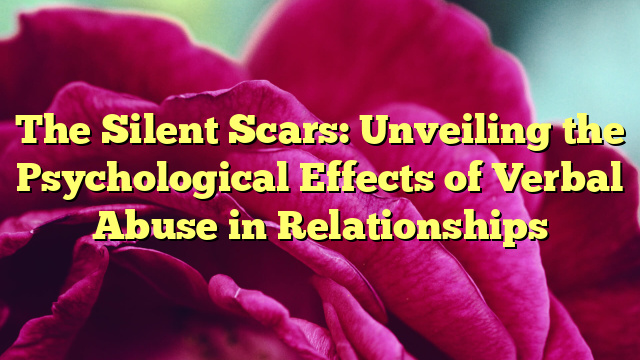The Silent Scars: Unveiling the Psychological Effects of Verbal Abuse in Relationships
The Silent Scars: Unveiling the Psychological Effects of Verbal Abuse in Relationships
Verbal abuse in relationships is often overlooked and dismissed as less harmful than physical abuse. However, the psychological effects of verbal abuse can be just as damaging, if not more so, than physical abuse. The scars left by verbal abuse are often silent, hidden beneath the surface, but they can have a profound impact on a person’s mental and emotional well-being.
The Psychological Effects of Verbal Abuse
Verbal abuse can take many forms, including name-calling, belittling, and constant criticism. These words and actions can erode a person’s self-esteem and self-worth, leading to feelings of worthlessness and inadequacy. The constant barrage of negative words and attitudes can create a toxic environment that leaves the victim feeling trapped and powerless.
One of the most insidious effects of verbal abuse is the way it can distort a person’s perception of themselves and their reality. Victims of verbal abuse may begin to internalize the negative messages they receive, leading to feelings of self-doubt and self-blame. They may also begin to question their own memories and experiences, as the abuser may gaslight them and manipulate the truth to suit their own agenda.
Verbal abuse can also have a profound impact on a person’s mental health. It can lead to anxiety, depression, and other mental health issues. The constant stress and emotional turmoil caused by verbal abuse can take a toll on a person’s overall well-being, leading to physical symptoms such as headaches, stomach problems, and insomnia.
Breaking the Cycle of Verbal Abuse
Breaking free from the cycle of verbal abuse can be incredibly challenging, but it is possible. The first step is recognizing that the abuse is happening and acknowledging the impact it is having on your mental and emotional well-being. It is important to reach out for support from friends, family, or a therapist who can help you navigate the complexities of verbal abuse and provide you with the tools to heal.
Setting boundaries with the abuser is also crucial. This may involve limiting contact with the abuser or cutting off communication entirely. It is important to prioritize your own well-being and safety, even if it means distancing yourself from the person who is causing you harm.
It is also important to work on rebuilding your self-esteem and self-worth. This may involve engaging in self-care activities, practicing self-compassion, and surrounding yourself with supportive and nurturing relationships. It is important to remind yourself that you are worthy of love and respect, and that the abuse is not a reflection of your value as a person.
Supporting Victims of Verbal Abuse
If you know someone who is experiencing verbal abuse, it is important to offer your support and validation. Listen to their experiences without judgment and let them know that you believe them. Encourage them to seek help from a therapist or support group, and offer to help them find resources in their community.
It is also important to be patient and understanding with the victim. Breaking free from the cycle of abuse is a complex and challenging process, and it may take time for the victim to fully recognize the impact of the abuse and take steps to heal. Offer your support and encouragement, and let them know that they are not alone.
Conclusion
Verbal abuse in relationships can have a profound impact on a person’s mental and emotional well-being. The scars left by verbal abuse may be silent, but they are no less damaging than physical abuse. It is important to recognize the signs of verbal abuse and offer support to those who are experiencing it. By breaking the cycle of abuse and providing support to victims, we can help to heal the silent scars left by verbal abuse and create a safer and more nurturing environment for all.

